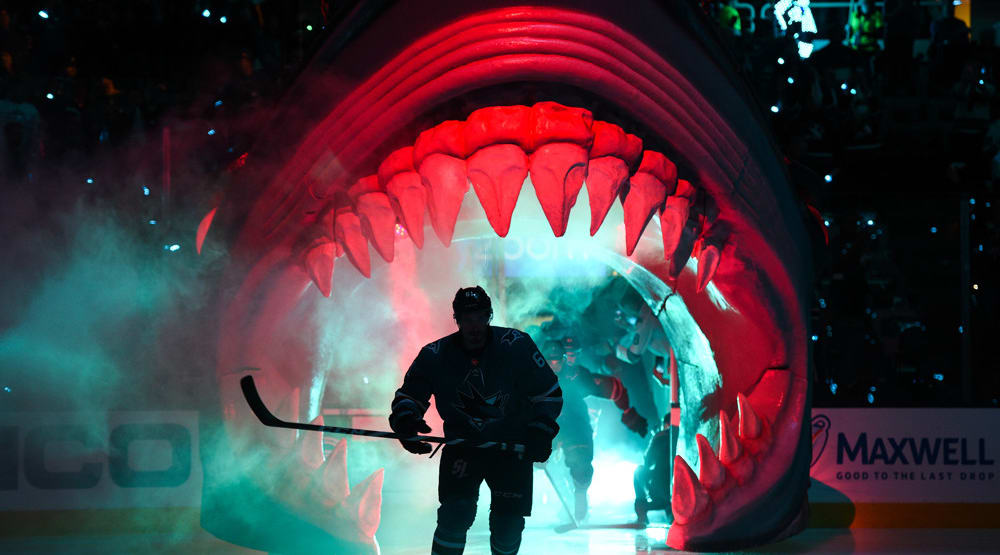Lack of scoring – an NHL concern?
Last season, the top point-getter in the NHL, Jamie Benn, recorded the lowest point total to lead the league in scoring since the 1967-68 season. Even more telling, you have to go back to 1947-48 to find a year when the scoring leader scored at a lower rate on a per-game basis – Elmer Lach produced 61 points in 60 games that season.
This season, there has already been plenty of talk about the perceived lack of scoring once again. That has led to a few non-traditional solutions been brought forward. The size of the nets has been unchanged at six feet wide by four feet high, while the size of the average goalie has steadily risen over the last 50 years. Maybe, some say, the NHL should move to change the net dimensions.
How about reducing the size of goal creases?
How about reducing the size of some goalie equipment?
How about shaving or molding the shape of goalposts in such a way that shots will be angled into the net as much as possible?
Okay, these ideas started out with a reasonable premise, about enlarging the size of the nets, but these other thoughts border on the side of increased danger and lack of protection for the men behind the masks.
I am a traditionalist who looks at last season as an anomaly; that's because I believe that defensive tactics and new hockey metrics have advanced to the point where
Lack of scoring – an NHL concern?
Last season, the top point-getter in the NHL, Jamie Benn, recorded the lowest point total to lead the league in scoring since the 1967-68 season. Even more telling, you have to go back to 1947-48 to find a year when the scoring leader scored at a lower rate on a per-game basis – Elmer Lach produced 61 points in 60 games that season.
This season, there has already been plenty of talk about the perceived lack of scoring once again. That has led to a few non-traditional solutions been brought forward. The size of the nets has been unchanged at six feet wide by four feet high, while the size of the average goalie has steadily risen over the last 50 years. Maybe, some say, the NHL should move to change the net dimensions.
How about reducing the size of goal creases?
How about reducing the size of some goalie equipment?
How about shaving or molding the shape of goalposts in such a way that shots will be angled into the net as much as possible?
Okay, these ideas started out with a reasonable premise, about enlarging the size of the nets, but these other thoughts border on the side of increased danger and lack of protection for the men behind the masks.
I am a traditionalist who looks at last season as an anomaly; that's because I believe that defensive tactics and new hockey metrics have advanced to the point where they reveal tendencies of all players.
In the end, defense caught up to offense around the league.
Before the league makes a change that it might regret, I think they need a larger sample size.
Look at what is happening in the early going of this season. No fewer than 17 players have produced at a point-per-game pace through the first month of the season. That is a big difference from the three players who scored over 82 points last year. So let's let this season play out to see if this year's scoring leaders finish like they've started or if they regress to last season's levels.
Goalies taking control
At the start of the season, there were as many competitive goalie battles as there were teams with clear No. 1 goalies around the league. Fantasy owners who drafted players from those "two-headed" situations have been given recent indicators that situations are changing.
Ottawa – Craig Anderson has received the lion's share of the load, appearing in 11 of the Senators 16 games and has been the goalie of record in six of the club's seven wins thus far. His partner Andrew Hammond made big headlines last season, but through the first 15 games here, he has taken a back seat.
Toronto – Jonathan Bernier signed a new two-year, $8.3 million contract, but he has stumbled out of the gate, going 0-6-1 in seven starts with an ordinary GAA (3.02) and save percentage (.899). Most recently, he's been sidelined with a leg injury. In his absence, James Reimer has been more than impressive, limiting opponents to 10 goals against in five straight starts, posting a 2-1-2 mark in that span. In nine total appearances, he has a 2.50 GAA and .918 save mark.
Calgary – The Flames have already used three goalies with varying results. Jonas Hiller is viewed as the main man but he has been sidelined with a nagging hip injury that saw him land on the injured reserve list Nov. 8. Prior to that, he had appeared in eight games, playing to an ugly 3.60 GAA and .887 save mark. That gave Karri Ramo and Joni Ortio a shot at some regular playing time. They each squandered an early opportunity, but with Hiller's injury, Ramo was recalled from the minors and has provided some stability in five straight starts (three wins).
St Louis – Jake Allen and Brian Elliott have shared the Blues' net for a couple of seasons and appeared headed for a similar, almost equal split once again this season. However, Elliott's numbers have not kept pace early on, despite the fact that he has a 4-0-1 record in his six starts. His 2.88 GAA and .888 save mark lag well behind what Jake Allen has produced in 10 appearances (1.53, .950).
Keeping a vigilant eye on evolving goalie situations is vital in leagues where wins and individual netminding statistics factor in.
Sleeper picks emerging
Artemi Panarin, CHI – The rookie winger has found an early chemistry with Patrick Kane that has propelled him to the top of the rookie scoring leaders, with 15 points in his first 15 games played. At 23 years of age, he is clearly showing the effects of a stint in the KHL in which he was able to hone his skills.
Mats Zuccarello, NYR – The undersized Norwegian has recorded seven goals and five assists through 15 games, coming back impressively from last postseason's scary head injury and trying to make people ignore the fact that he is the smallest forward on this roster by a wide margin.
Troy Brouwer, STL – The burly winger has always been known as a depth player, but he had a nice run in parts of the last two seasons as a first-line winger in Washington, which provided a glimpse of his offensive upside, as he surpassed the 20-goal mark a couple times. The Blues picked him up because they wanted a more physical presence in their lineup, believing that he would be best suited to a depth role there. Well. He has continued to display his offensive prowess to the tune of 11 points in his first 15 games with the Blues and has averaged over two minutes per game on their power-play unit.
Dale Weise, MON – Perhaps no other player has elevated his profile like Weise. Long-regarded as a fourth-line plugger who set a career high with 10 goals last season, he parlayed a strong playoff performance into an early promotion and more playing time to start this season. Weise has responded by producing eight goals and three assists in 16 games while averaging a career-high 13:45 on the ice, even getting some time on the Habs' explosive power play.
More notable recent producers
Jeff Carter, LOS – With three goals and two assists playing in his usual spot between Tyler Toffoli and Milan Lucic, he continues to center the lone consistently productive forward line in Los Angeles.
Travis Zajac and Lee Stempniakm NJD – The Devils' scoring was expected to be limited, but these two veterans have contributed sufficient offense to propel the club to a surprising 8-6-1 record. Zajac (11 points and a plus-7) is on pace to produce his best scoring totals in five years, perhaps even rivaling his career-best marks. Stempniak, meanwhile, has 12 points in 15 games and is trying to show that he deserves top-six minutes. He, too, is on pace for a career year.
Mikkel Boedker and Martin Hanzal, ARI – With the outstanding impact of rookies Max Domi and Anthony Duclair, fantasy owners should be drawn to an offense that has produced much more than was expected. It is worth acknowledging the output of these two youthful veterans who are also producing at a combined point-per-game pace – again, ahead of their career norms.































